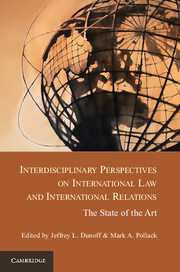 Interdisciplinary Perspectives on International Law and International Relations
Interdisciplinary Perspectives on International Law and International Relations Published online by Cambridge University Press: 05 January 2013
It now seems more important to make domestic courts agents of world order than to instruct them to be servants of national policy.
Richard Falk, 1964National courts’ interpretation of international law inspires both high expectations about the potential enforceability and uniformity of international law and doubts about the legitimacy of this activity. Many international lawyers and scholars of international law (IL) and international relations (IR) conceive of national courts as powerful “agents” of enforcement that could promote the development of a more effective system of international law. Enlisting the authority of domestic courts in the service of international law becomes a means to promote adherence to evolving norms. Functionalist approaches highlight the need for dispute resolution in a globalizing world that still lacks adequate international institutional mechanisms. The optional jurisdiction of many international courts and the limited capacity of others to hear the volume of disputes arising within a regional or global jurisdiction creates an institutional vacuum that can only be addressed by national courts (Falk 1964; Martinez 2003; Buxbaum 2005–06; Kirby 2005–06; Whytock 2009–10; Michaels 2011a; Nollkaemper 2011). National courts have responded to this demand, interpreting and applying international legal norms much more often than even the most active international courts (Conant 2002; Geeroms 2004; Sloss 2009; Whytock 2009–10; Sloss, Ramsey, and Dodge 2011a). Chronicles of the globalization of judicial dialogue, in which national judges increasingly refer to each other's interpretations, suggest that domestic courts can contribute toward uniformity and consensus (Slaughter 1999–2000, 2003, 2004). Yet, empirical accounts uncover inconsistent applications of international law that generate legal diversity and uncertainty (Conant 2002; Stephan 2002; Martinez 2003; Hofstötter 2005; Ramos Rameu 2006; Dunoff 2008; Wind 2010). Indeed, many of the international lawyers who see promise in domestic courts are disappointed by inadequate applications of international law in these venues (Franck and Fox 1996; Conforti and Francioni 1997; Hunt 1997; Koh 1997a). Finally, conventional accounts identify the United States as an exceptional case of judicial parochialism (Slaughter 1999–2000, 2003; Flaherty 2006; Slaughter and Burke-White 2006), but the pattern of international legal interpretation in U.S. courts defies any isolationist categorization once examined historically and across fields of law (Koh 1991; Martinez 2003; Geeroms 2004; Cleveland 2006; Whytock 2009–10; Sloss et al. 2011a).
To save this book to your Kindle, first ensure no-reply@cambridge.org is added to your Approved Personal Document E-mail List under your Personal Document Settings on the Manage Your Content and Devices page of your Amazon account. Then enter the ‘name’ part of your Kindle email address below. Find out more about saving to your Kindle.
Note you can select to save to either the @free.kindle.com or @kindle.com variations. ‘@free.kindle.com’ emails are free but can only be saved to your device when it is connected to wi-fi. ‘@kindle.com’ emails can be delivered even when you are not connected to wi-fi, but note that service fees apply.
Find out more about the Kindle Personal Document Service.
To save content items to your account, please confirm that you agree to abide by our usage policies. If this is the first time you use this feature, you will be asked to authorise Cambridge Core to connect with your account. Find out more about saving content to Dropbox.
To save content items to your account, please confirm that you agree to abide by our usage policies. If this is the first time you use this feature, you will be asked to authorise Cambridge Core to connect with your account. Find out more about saving content to Google Drive.